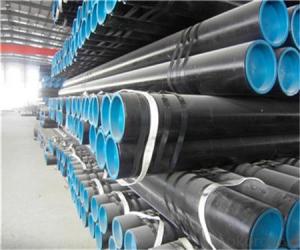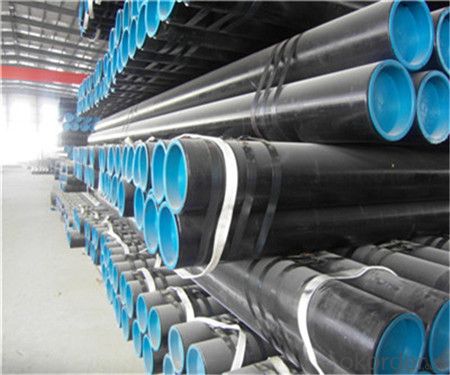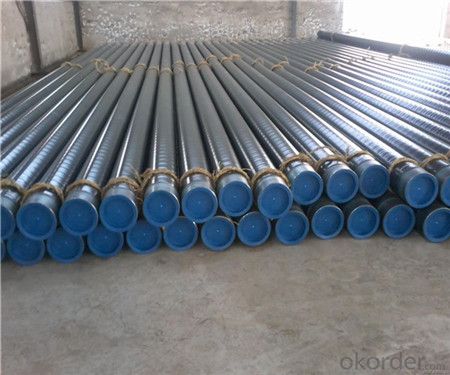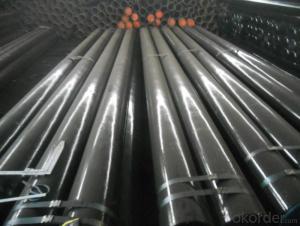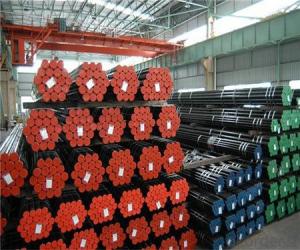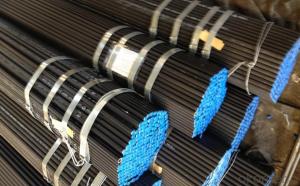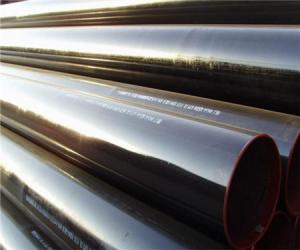Seamless Steel Pipe China ASTM A106/A53/API5L Gr.B Factory
- Loading Port:
- Tianjin
- Payment Terms:
- TT OR LC
- Min Order Qty:
- 25 m.t.
- Supply Capability:
- 12000 m.t./month
OKorder Service Pledge
OKorder Financial Service
You Might Also Like
Product Description:
1、CS SEAMLESS PIPE ASTM A53/ ASTM A106/ API 5L GR B description:
Seamless pipe is formed by drawing a solid billet over a piercing rod to create the hollow shell.
As the manufacturing process does not include any welding, seamless pipes are perceived to be stronger and more reliable.
Historically seamless pipe was regarded as withstanding pressure better than other types, and was often more easily available than welded pipe.
2、CS SEAMLESS PIPE ASTM A53/ ASTM A106/ API 5L GR B Features :
• High manufacturing accuracy
• High strength
• Small inertia resistance
• Strong heat dissipation ability
• Good visual effect
• Reasonable price
3、Standard :ASTM A106, ASTM A53, ISO3183-2-1996
● Application: To be used for conveyance of petroleum, gas and conveyance of other fluid.
Standard: GB3087: Seamless Steel Tubes for Low and Medium Pressure Boiler
● Application: For manufacturing heating-pipelines, containers, steaming pipelines of low or medium pressure
boilers (p≤450℃, work pressure ≤5.88 Mpa)...
4、Packaging & Delivery of CS SEAMLESS PIPE ASTM A53/ ASTM A106/ API 5L GR B
Packaging Details: | seaworthy package,bundles wrapped with strong steel strip |
Delivery Detail: | 30-45days after received 30%TT |
FAQ of Seamless Pipe ASTM A106/53:
①Quality
Our products are manufactured strictly according to national and internaional standard, and we take a test
on every pipe before delivered out. If you want see our quality certifications and all kinds of testing report, please just ask us for it.
Guaranteed: If products’ quality don’t accord to discription as we give or the promise before you place order, we promise 100% refund.
②Price
Yes, we are factory and be able to give you lowest price below market one, and we have a policy that “ for saving time and absolutely honest business attitude, we quote as lowest as possible for any customer, and discount can be given according to quantity”,if you like bargain and factory price is not low enough as you think, just don’t waste your time.Please trust the quotation we would give you, it is professional one.
Why us?
▲ CNBM is a state owned enterprise, which background ensures it of funds support and preferential policies
provide by ministry of commerce.
▲ CNBM enjoys a sound reputation both at home and aboard. The company stands a first-rate credit status
and has gained the access to preferential loans through a lot of international banking organizations.
▲ The company is renowned of it manufacturing capabilities and overall sourcing abilities. It has a long
track proven record of strategic cooperation with leading players in steel industry.
▲ Brand name “CMAX” commit to the best quality products and high cost effectiveness which ensures your
company a booming development & success.
Professional teams ensure a high efficiency of your purchase
▲ Professional sales team
▲ Professional engineering and technology team
▲ Professional exportation and contract processing/management team
▲ Professional cooperators and partners
Looking forward to doing the corporation with you
Any question, kindly feel free to contact us !
CS SEAMLESS PIPE ASTM A53/ ASTM A106/ API 5L GR B Images:
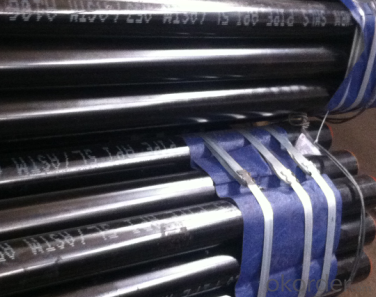
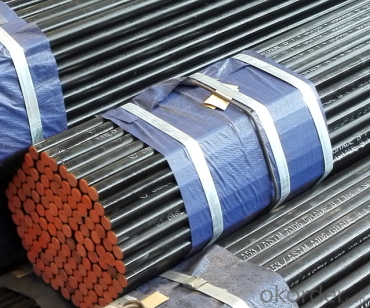
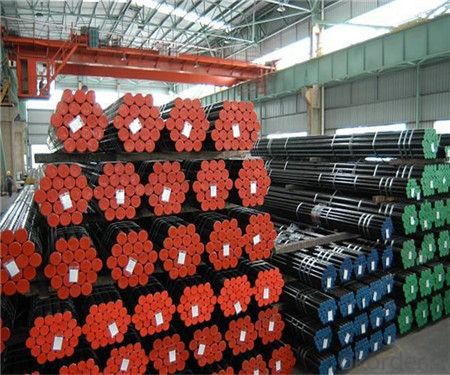
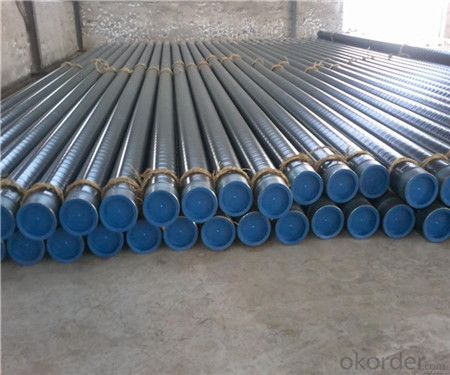
- Q: How are steel pipes tested for mechanical strength?
- Steel pipes are typically tested for mechanical strength through various destructive and non-destructive testing methods. Destructive tests involve subjecting the pipes to tension, compression, or bending forces until failure occurs, allowing the measurement of their ultimate tensile strength, yield strength, and elongation. Non-destructive tests, such as ultrasonic testing, magnetic particle inspection, or radiographic examination, are also conducted to detect any internal or surface defects that may affect the mechanical strength of the pipes. These tests ensure that steel pipes meet the required standards and specifications in terms of their mechanical strength.
- Q: Are steel pipes suitable for structural purposes?
- Indeed, steel pipes are well-suited for structural purposes. Renowned for their robustness, longevity, and flexibility, steel pipes prove to be an exceptional option for a variety of structural uses. They can endure substantial loads, furnish exceptional structural support, and exhibit resistance to both corrosion and severe weather conditions. In construction ventures, bridges, edifices, and infrastructure systems such as water and gas pipelines, steel pipes are frequently employed. Furthermore, steel pipes can be effortlessly welded, curved, and sliced to meet specific structural prerequisites, rendering them highly adaptable to diverse construction needs. On the whole, steel pipes are widely acknowledged as a dependable and effective choice for structural applications.
- Q: What is the tensile strength of steel pipes?
- The tensile strength of steel pipes can vary depending on the grade and type of steel used. However, in general, steel pipes have a high tensile strength. Typically, carbon steel pipes have a tensile strength range of 370 to 700 megapascals (MPa), while alloy steel pipes can have a tensile strength range of 770 to 1200 MPa. These high tensile strengths allow steel pipes to withstand high levels of pressure and stress, making them suitable for a wide range of applications such as in the construction, oil and gas, and automotive industries. It is important to note that the tensile strength of steel pipes can also be influenced by other factors such as the manufacturing process, heat treatment, and the presence of any defects or imperfections. Therefore, it is advisable to consult the specifications provided by the manufacturer or industry standards to determine the exact tensile strength of a specific steel pipe.
- Q: What are the different types of pipe coatings used for corrosion protection?
- There are several types of pipe coatings used for corrosion protection, including epoxy coatings, polyethylene coatings, polyurethane coatings, and zinc coatings. Each type of coating offers specific advantages and is chosen based on factors such as the type of corrosive environment, the desired level of protection, and the budget constraints.
- Q: What is the bending strength of steel pipes?
- Steel pipes have the ability to withstand bending forces without breaking or permanently deforming, which is known as their bending strength. This strength can vary depending on factors like the type of steel, the grade of steel, the diameter and thickness of the pipe, and the manufacturing process. Steel pipes are highly durable and strong, making them suitable for many different uses. The bending strength of steel pipes is typically measured by the maximum bending moment or stress that the pipe can handle without failing. Engineers and manufacturers determine the bending strength of steel pipes using various testing methods, such as three-point or four-point bending tests. These tests involve applying a known force or moment to the pipe and measuring its deflection or stress response. The bending strength of steel pipes can also be affected by mechanical properties like yield strength, tensile strength, and elongation. These properties determine the overall strength and ductility of the steel, which are crucial for its bending strength. It's important to note that the bending strength can vary depending on the specific application and the load conditions. For instance, pipes used in structural or load-bearing applications may require higher bending strength than pipes used for plumbing or conveyance purposes. In conclusion, the bending strength of steel pipes is determined by factors such as the type of steel, the grade of steel, the diameter and thickness of the pipe, and the manufacturing process. Testing methods and mechanical properties are used to assess the bending strength of steel pipes, ensuring they are suitable for different uses and load conditions.
- Q: What is the buckling type thin-wall steel pipe? What is a tight set of thin-walled steel tubes? What's the difference between the two?
- The nut body and the junction box are connected at one end by adopting metric fine tooth thread, and the pipe is connected with the pipe, and one end is the same as the straight pipe joint (direct). Withhold the box joint points inside and outside teeth two. The diameter of straight pipe joint is divided into 16mm, 20mm, 25mm, 32mm, 40mm, 50mm.
- Q: Can steel pipes be used for underground air supply systems?
- Yes, steel pipes can be used for underground air supply systems. Steel pipes are commonly used for underground applications due to their durability, strength, and resistance to corrosion. They can effectively transport compressed air, making them suitable for underground air supply systems.
- Q: Steel pipe is particularly long, how to clean the inner wall of the pipe so that it can be thoroughly cleaned
- If the pipe is relatively long, you have water, you can buy ultrasonic vibration plate into the water for ultrasonic cleaning, if not too long with an ultrasonic vibration rod, inserted into the pipe cleaning, and then rinse with water by ultrasonic stripping of dirt, give you recommend a factory in Jining Hengda
- Q: How are steel pipes used in the construction of biomass power plants?
- Steel pipes are used in biomass power plants for various applications such as transporting biomass fuel, carrying water for steam generation, and distributing hot water or steam throughout the plant. They provide a sturdy and reliable infrastructure for the efficient functioning of the plant, ensuring the safe and effective operation of the biomass power generation process.
- Q: What are the different testing methods used for steel pipes?
- There are various testing methods used for steel pipes, including non-destructive testing methods such as ultrasonic testing, magnetic particle testing, radiographic testing, and liquid penetrant testing. These methods help detect any defects or flaws in the pipes, ensuring their quality and integrity. Additionally, destructive testing methods such as tensile testing, impact testing, and hardness testing are also used to evaluate the mechanical properties of the steel pipes.
Send your message to us
Seamless Steel Pipe China ASTM A106/A53/API5L Gr.B Factory
- Loading Port:
- Tianjin
- Payment Terms:
- TT OR LC
- Min Order Qty:
- 25 m.t.
- Supply Capability:
- 12000 m.t./month
OKorder Service Pledge
OKorder Financial Service
Similar products
Hot products
Hot Searches
Related keywords
